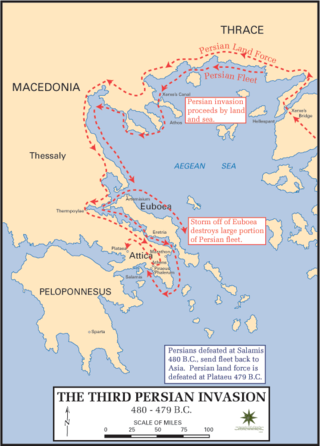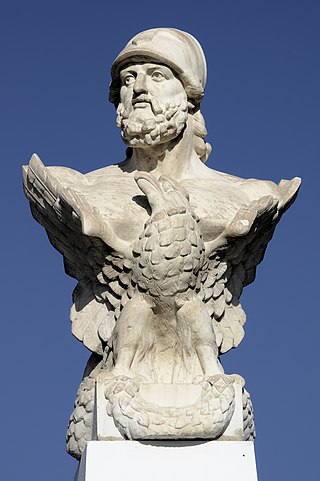
Ostracism was an Athenian democratic procedure in which any citizen could be expelled from the city-state of Athens for ten years. While some instances clearly expressed popular anger at the citizen, ostracism was often used preemptively. It was used as a way of neutralizing someone thought to be a threat to the state or a potential tyrant, though in many cases popular opinion often informed the expulsion. The word "ostracism" continues to be used for various forms of shunning.

The 5th century BC started the first day of 500 BC and ended the last day of 401 BC.

Year 490 BC was a year of the pre-Julian Roman calendar. At the time, it was known as the Year of the Consulship of Camerinus and Flavus. The denomination 490 BC for this year has been used since the early medieval period, when the Anno Domini calendar era became the prevalent method in Europe for naming years.
This article concerns the period 489 BC – 480 BC.
This article concerns the period 469 BC – 460 BC.

Year 480 BC was a year of the pre-Julian Roman calendar. At the time, it was known as the Year of the Consulship of Vibulanus and Cincinnatus. The denomination 480 BC for this year has been used since the early medieval period, when the Anno Domini calendar era became the prevalent method in Europe for naming years.
Year 482 BC was a year of the pre-Julian Roman calendar. At the time, it was known as the Year of the Consulship of Vibulanus and Iullus. The denomination 482 BC for this year has been used since the early medieval period, when the Anno Domini calendar era became the prevalent method in Europe for naming years.
Year 461 BC was a year of the pre-Julian Roman calendar. At the time, it was known as the Year of the Consulship of Gallus and Cornutus. The denomination 461 BC for this year has been used since the early medieval period, when the Anno Domini calendar era became the prevalent method in Europe for naming years.

Archon is a Greek word that means "ruler", frequently used as the title of a specific public office. It is the masculine present participle of the verb stem αρχ-, meaning "to be first, to rule", derived from the same root as words such as monarch and hierarchy.

Cleisthenes, or Clisthenes, was an ancient Athenian lawgiver credited with reforming the constitution of ancient Athens and setting it on a democratic footing in 508 BC. For these accomplishments, historians refer to him as "the father of Athenian democracy". He was a member of the aristocratic Alcmaeonid clan. He was the younger son of Megacles and Agariste making him the maternal grandson of the tyrant Cleisthenes of Sicyon. He was also credited with increasing the power of the Athenian citizens' assembly and for reducing the power of the nobility over Athenian politics.

The Alcmaeonidae or Alcmaeonids were a wealthy and powerful noble family of ancient Athens, a branch of the Neleides who claimed descent from the mythological Alcmaeon, the great-grandson of Nestor.
The Attic calendar or Athenian calendar is the lunisolar calendar beginning in midsummer with the lunar month of Hekatombaion, in use in ancient Attica, the ancestral territory of the Athenian polis. It is sometimes called the Greek calendar because of Athens's cultural importance, but it is only one of many ancient Greek calendars.

Cimon or Kimon was an Athenian strategos and politician.
Ephialtes was an ancient Athenian politician and an early leader of the democratic movement there. In the late 460s BC, he oversaw reforms that diminished the power of the Areopagus, a traditional bastion of conservatism, and which are considered by many modern historians to mark the beginning of the radical democracy for which Athens would become famous. These powers included the scrutiny and control of office holders, and the judicial functions in state trials. He reduced the property qualifications for holding a public office, and created a new definition of citizenship. Ephialtes, however, would not live to participate in this new form of government for long. In 461 BC, he was assassinated, probably at the instigation of resentful oligarchs, and the political leadership of Athens passed to his deputy, Pericles.
In ancient Greece the chief magistrate in various Greek city states was called eponymous archon. "Archon" means "ruler" or "lord", frequently used as the title of a specific public office, while "eponymous" means that he gave his name to the year in which he held office, much like the Roman dating by consular years.
The Areopagite constitution is the modern name for a period in ancient Athens described by Aristotle in his Constitution of the Athenians. According to that work, the Athenian political scene was dominated, between the ostracism of Themistocles in the late 470s BC and the reforms of Ephialtes in 462 BC, by the Areopagus, a traditional court composed of former archons. Modern scholars have debated the existence of this phenomenon, with some concluding that Aristotle and his contemporaries invented it to explain Ephialtes' need to limit the Areopagus' powers, and arguing that the lack of concrete measures establishing the Areopagus' dominance shows that the Areopagite constitution is "palpably unhistorical". Other scholars, such as Donald Kagan, have countered that no concrete measures were necessary, as the Areopagus' dominance was established not through actual changes in the laws but through the prestige of its leading members. Aristotle specifically cites the Areopagites' distribution of money to the public as the citizen body prepared to abandon Athens in the face of the advancing Persian army.

Xanthippus was a wealthy Athenian politician and general during the early part of the 5th century BC. His name means "Yellow Horse". He was the son of Ariphron and father of Pericles. A marriage to Agariste, niece of Cleisthenes, linked Xanthippus with the Alcmaeonid clan, whose interests he often represented in government. He distinguished himself in the Athenian political arena, championing the aristocratic party. His rivalry with Themistocles led to his ostracism, but he was recalled from exile when the Persians invaded Greece. Xanthippus' actions in the ensuing Greco-Persian Wars contributed significantly to the victory of the Greeks and the subsequent ascendancy of the Athenian Empire.

The following outline is provided as an overview of and topical guide to ancient Greece:

Athenian democracy developed around the 6th century BC in the Greek city-state of Athens, comprising the city of Athens and the surrounding territory of Attica, and focusing on supporting liberty, equality, and security. Although Athens is the most familiar of the democratic city-states in ancient Greece, it was not the only one, nor was it the first; multiple other city-states adopted similar democratic constitutions before Athens. By the late 4th century BC, as many as half of the over one thousand existing Greek cities might have been democracies. Athens practiced a political system of legislation and executive bills. Participation was open to adult, free male citizens Adult male citizens probably constituted no more than 30 percent of the total adult population.

The Athenian Revolution was a revolt by the people of Athens that overthrew the ruling aristocratic oligarchy, establishing the almost century-long self-governance of Athens in the form of a participatory democracy – open to all free male citizens. It was a reaction to a broader trend of tyranny that had swept through Athens and the rest of Greece.











